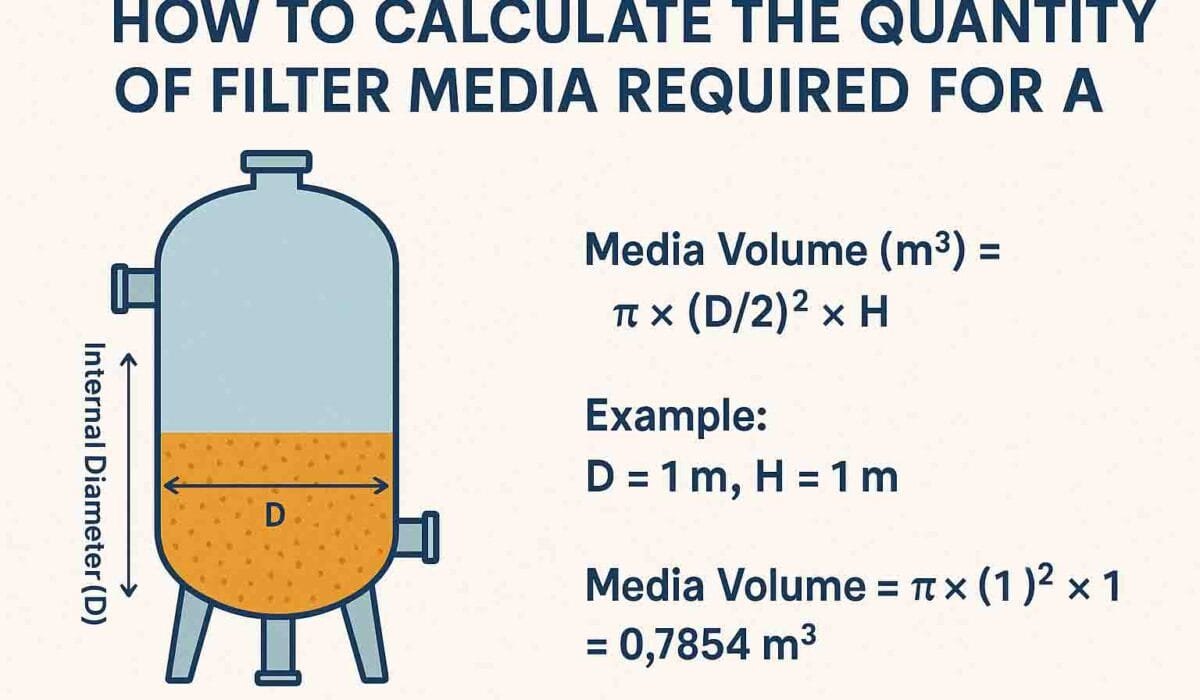How to Calculate the Quantity of Filter Media Required for a Water Filter Vessel
In water treatment, accurate filter media quantity calculation is crucial for proper system design, performance, and cost efficiency. Overfilling or underfilling a vessel can lead to poor filtration, media loss, or system failure.
In this blog, Starke Filter Media, with over 20 years of filtration expertise, shares a simple, practical method to calculate the amount of filter media required for any filtration vessel – whether it’s FRP, MS, SS, or RCC.
Why Filter Media Quantity Matters
Filter media like sand, activated carbon, anthracite, garnet, and Purozite™ work best when filled to the correct volume. Proper loading ensures:
Effective contact time
Uniform filtration
Low pressure drop
Maximum contaminant removal
Reduced media wastage
Basic Formula for Filter Media Quantity Calculation
To determine the filter media requirement, you need to calculate the volume of the media bed inside the vessel using this formula:
Media Volume (m³) = π × (D/2)² × H
Where:
π= 3.1416D= Internal Diameter of the vessel (in meters)H= Media bed height (in meters)
Pro Tip from Starke: For standard filters, the bed depth is generally 0.6–1.0 meters depending on the media type and application.
Step-by-Step Guide with Example
Let’s walk through an example:
Filter Vessel Size:
Diameter (D) = 1 meter
Media Bed Height (H) = 1 meter
Step 1: Use the formula
Media Volume = π × (1/2)² × 1 = 3.1416 × 0.25 × 1 = 0.7854 m³
Step 2: Convert volume to weight
To convert m³ to kg, multiply by the bulk density of the media:
| Media Type | Bulk Density (Kg/m³) |
|---|---|
| Sand (0.6–1 mm) | 1500–1600 |
| Anthracite | 850–900 |
| Activated Carbon | 500–600 |
| Garnet | 2000–2200 |
| Purozite™ Zeolite | 800–850 |
For example, if using sand:
Media Weight = 0.7854 × 1600 = 1256.64 Kg
So, you would need approximately 1300 Kg of sand to fill this vessel.
Media Layering for Dual/Multimedia Filters
In multi-layer filters, media like garnet, sand, and anthracite are used in layers based on their specific gravity and size.
Layering Example for a 1-meter bed:
| Media | Bed Depth (m) | Bulk Density (Kg/m³) | Volume (m³) | Approx. Weight (Kg) |
|---|---|---|---|---|
| Garnet | 0.2 | 2000 | 0.157 | 314 |
| Sand | 0.4 | 1650 | 0.314 | 518 |
| Anthracite | 0.4 | 900 | 0.314 | 283 |
This configuration enhances turbidity removal and extends filter run time.
Backwash Freeboard: Don’t Forget the Space!
Leave 30–40% freeboard (empty space) above the media bed for backwashing. This allows the media to expand and flush out trapped particles.
For a 1.5-meter tall vessel:
Media Bed = 1.0 meter
Freeboard = 0.5 meter
Tools to Simplify the Process
You can also use the Starke Filter Media Calculator a free online tool to calculate media quantity based on your vessel size and media type.
FAQs on Filter Media Quantity Calculation
Q1. How much sand is required for a 24-inch FRP vessel?
A 24” diameter vessel (0.61 m) with a 1 m bed would need approx. 470–500 Kg of sand.
Q2. Can I fill different media in the same vessel?
Yes, using dual/multimedia improves performance. Ensure heavier media is placed at the bottom.
Q3. What if my vessel is horizontal?
Use the same volume formula, considering the cylindrical shape. You may need a custom layout based on internals.
Final Thoughts
Accurate filter media quantity calculation is key to building an efficient and long-lasting water filtration system. Whether you are installing an industrial sand filter or a domestic activated carbon unit, using the correct volume and weight of media ensures optimal filtration.
At Starke Filter Media, we help you get it right – every time.
Need help calculating the media for your filter vessel?
Email us at info@starkefiltermedia.com
www.starkefiltermedia.com

